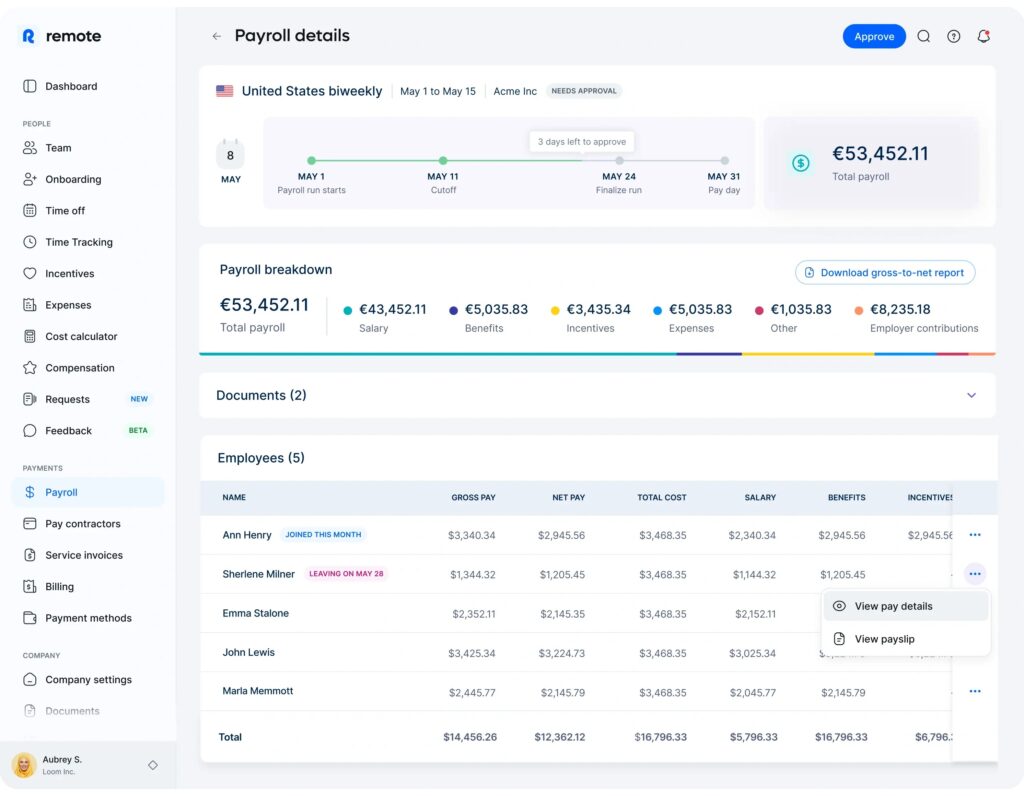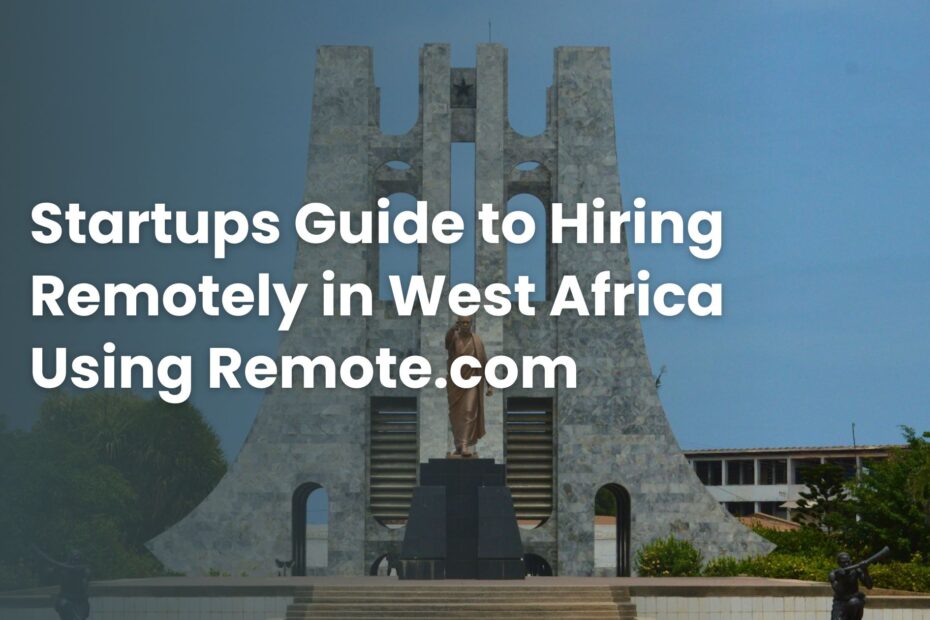Talk to any startup looking to hire remote talent, and they all run into the same headaches:
- Struggling to find the right professionals
- Complex legal landscapes
- Confusing tax rules
- Payments and payroll chaos.
The thing is, these challenges are global, and West Africa’s no exception. Countries like Nigeria, Ghana, Senegal, Cameroon, and Côte d’Ivoire are overflowing with talent
But as many founders have learned, it’s not about talent availability. It’s about how to legally onboard, manage, and pay them. And no matter how small your remote hiring needs are, the process quickly goes beyond a spreadsheet.
Remote.com is one of the big names in the industry helping handle the things that founders often underestimate in global talent acquisition. Think contracts, compliance, payroll, and taxes.
In this post, I’ll take you through how to hire remote talent in West Africa using Remote, and stay compliant while paying and managing your teams.
Table of Contents
What is remote.com?
Remote.com is a platform that helps companies hire and pay workers in other countries. It offers a range of tools to make global hiring simple and compliant.
With its Employer of Record (EOR) service, you can hire full-time employees in another country, without setting up a local legal entity there. For short-term needs, Remote also lets you hire and manage independent contractors.
Beyond hiring, Remote comes with a global payroll system, a simple HRIS, and other tools for managing remote teams. Tools such as contracts management, employee onboarding, compliance, payroll, and benefits administration are part of its suite of tools.
The idea is simple: Remote acts as your all-in-one partner for HR, payroll, and compliance.
What tools does remote offer for startups hiring in West Africa
If you’re a startup looking to hire in West Africa, you need access to talent. But beyond this, you also need the right tools to do it legally and efficiently. Remote.com offers several features that make it easier to hire, onboard, manage, and pay workers across the region.
Here’s a look at what Remote provides for startups hiring in West Africa.
Remote’s Recruit Platform
Recruit is one of the newer tools from Remote, and a very important one if you’re hiring remotely in places like Nigeria, Ghana, Senegal and other West African countries. At its core, Recruit is meant to simplify the early steps of the hiring process.
Startups can use it to post job openings, find candidates, and get matched with potential hires using AI. The tool also includes some data features to help with hiring decisions.
Remote’s Global Payroll
Once hiring is out of the way, the next big challenge is payment. This involves making sure your team gets paid for work done. That’s where Remote’s payroll tool comes in.

For startups hiring in West Africa, it helps simplify one of the trickiest parts of cross-border work: paying people in the right currency, on time, and in line with local laws.
But that is not all. Taxes, deductions, and compliance requirements are built into the system. This ensures that how professionals are paid, when they are paid, and an entire startup’s dealings are within the confines of the country’s laws.
HRIS (Human Resource Information System)
Remote’s HRIS is designed to help companies manage their teams after hiring. It includes tools to track performance, automate workflows, and generate reports. You can also monitor compliance and benchmark salaries across different markets.
For startups building remote teams, especially across regions like West Africa, having these features in one place can save time and reduce errors.
I can’t promise that it’s as advanced as some dedicated HR platforms, but it covers the essentials, especially for a remote team, like employee records, basic HR tasks, and integration with payroll.
Contractor Management
Not every hire needs to be full-time. For startups working with freelancers, creatives, or tech talent across West Africa, managing contracts, payments, and compliance can get messy fast. Remote’s contractor management tool gives you a way to stay organized, from creating localized contracts to handling invoices.
You can do all these without needing a local entity in each country. It’s a practical option for early-stage teams hiring on a project or part-time basis.
Remote’s Employer of Record
For startups ready to make long-term hires in West Africa but without a legal entity on the ground, an Employer of Record (EOR) can be a practical route.
Remote’s EOR solution acts as the legal employer, handling local compliance, payroll, taxes, and benefits. It’s especially useful in countries where employment regulations are complex or constantly evolving.
Remote’s Hiring Options in West Africa: A Country-by-Country Breakdown
Hiring across West Africa isn’t a one-size-fits-all process. Each country has its own employment laws, tax rules, and infrastructure challenges.
As such, Remote.com may offer different levels of support depending on the country you’re hiring from as a startup. The options you’ll be presented with are mostly hiring through an Employer of Record (EOR), working with contractors, or using specific features like payroll or compliance tools.
In this section, I’ll break down what Remote offers in key West African markets, so you can better understand what’s possible and what to expect.
Nigeria
Nigeria is West Africa’s largest and fastest-growing talent hub, especially in tech. For startups looking to hire remotely, the legal, payroll, and compliance landscape can be complex.
Remote offers the following options for startups looking to hire talent in the country.
Contractor Management
This is for startups engaging freelancers or independent contractors, with localized contracts and automated invoice approvals. The price is $29 per contractor/freelancer per month.
Employer of Record (EOR)
If you’re a startup or company looking to engage remote talent on a full-time basis without setting up a legal entity in Nigeria, this is your best option. In this case, Remote becomes the legal employer, handling onboarding, payroll, benefits, and taxes, while you focus on the day-to-day tasks of the employee. Price is $599 per employee per month.
There’s also Payroll
This is Remote’s tool for startups/companies that already have a local entity and need to run compliant, local payroll in Nigeria. This costs $29 per employee per month.
Below is a breakdown of the costs and features of each of the options
Ghana
Like most countries, hiring in Ghana requires careful attention to legal and administrative details. There are local labor laws, tax rules, and payroll requirements that companies must follow to stay compliant. And Remote is well positioned to help startups navigate the landscape.
Remote currently offers three main products for companies hiring in Ghana:
Contractor Management
Companies can use Remote to hire and pay contractors in Ghana. This option is suitable for freelance or short-term work. Under this option, tools provided by Remote include localized contracts, tools for managing invoices, and automated payments.
- Price: $29 per contractor/month
- Best for: Startups hiring independent workers without needing to open a local entity
Employer of Record (EOR)
If you’re a startup without a legal entity, Remote can serve as your official employer in Ghana. This includes handling employment contracts, payroll, benefits, and tax compliance. It’s the easiest way to hire full-time employees in Ghana legally.
- Price: $599 per employee/month
- Best for: Businesses hiring full-time team members without setting up a local office
Payroll
If you already have a legal entity in Ghana, you can use Remote’s payroll tool to run local payroll in compliance with Ghanaian laws. The system handles taxes, deductions, and reporting, and integrates with other HR tools.
- Price: $29 per employee/month
- Best for: Companies already registered in Ghana but looking for help managing payroll processes
Senegal

Startups looking to hire in Senegal have a few options depending on their team size and setup. Remote currently supports contractor management in Senegal, allowing you to work with local freelancers and self-employed professionals. You can pay contractors in some currencies, draft compliant contracts, and approve invoices.
If you’re considering hiring full-time employees, you’ll typically need to set up a legal entity or work through an Employer of Record (EOR).
Remote’s EOR service isn’t currently available in Senegal, but if that changes, it could take over local compliance, payroll, and benefits on your behalf.
Côte d’Ivoire

Between managing salaries in West African CFA francs, handling taxes, and making sure everything aligns with local labor laws, there’s a lot to stay on top of if you’re a startup hiring in Côte d’Ivoire.
Remote currently supports only contractor payments in Côte d’Ivoire. This allows you to create compliant contracts, automate invoices, and pay in supported currencies.
However, if you plan to hire full-time employees, you’ll either need to set up your own entity or use other EOR providers that work in the country.
Available:
- Contractor Management
- Employer of Record (EOR) not available yet
- Payroll is also not available
Cameroon

Cameroon offers a rich talent pool across Francophone and Anglophone regions.
Remote offers Contractor Management and Employer of Record (EOR) services in Cameroon. You can pay contractors easily with localized contracts and invoice tools. For full-time employees, Remote acts as the legal employer, handling payroll, taxes, and compliance.
Available:
- Contractor Management ($29/month per contractor)
- Employer of Record (EOR) ($599/month per employee)
Final Thoughts on Hiring Remotely in West Africa
Hiring across West Africa isn’t one-size-fits-all. Labor laws, payroll systems, and available hiring options can vary widely from one country to another.
However, what’s consistent is the growing pool of talent, from established tech scenes to emerging startup hubs.
Remote offers different levels of support depending on the country you are hiring from. In some countries, you can manage contractors easily; in others, you have full EOR coverage.
If you’re building a distributed team across the continent, it helps to know where you can scale quickly, as well as where things may take more setup or local context.
This guide isn’t exhaustive, but it’s a starting point. I only focused on a few talent markets in the West Africa region. And as more African countries build out their digital infrastructure and talent keeps crossing borders, having flexible hiring tools becomes less of a nice-to-have and more of a necessity.
Start hiring remote talent with Remote
Disclaimer: I’m an affiliate of Remote, which means I may earn a commission if you sign up through some of the links in this post. While I’ve made every effort to keep this guide informative and objective, please consider that affiliation when evaluating the content. Always do your own research before choosing a global employment platform.
- Guide for Global Startups to Hire Remote Talent from Africa: Talent Agency VS Bootcamps VS Global Talent Networks - August 11, 2025
- Startups Guide to Hiring Remotely in West Africa Using Remote.com - August 1, 2025
- Arbonum: Streamlining Global Contractor Management with Ease and Efficiency - July 16, 2024
